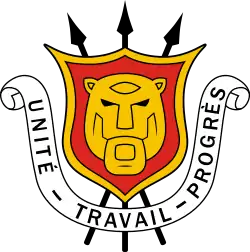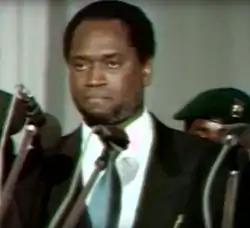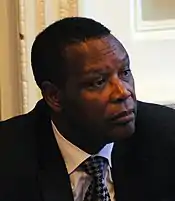1993 Burundian presidential election
Presidential elections were held in Burundi on 1 June 1993 following the approval of a new constitution in a referendum the previous year. They were the first multi-party elections for the presidency, the only previous elections in 1984 having been held at a time when the country was a one-party state. This election was a watershed for Burundi, representing the end of a military backed Tutsi state, and the birth of democracy.
| |||||||||||||||||
| Turnout | 97.3% | ||||||||||||||||
|---|---|---|---|---|---|---|---|---|---|---|---|---|---|---|---|---|---|
| |||||||||||||||||
| |||||||||||||||||
 |
|---|
| This article is part of a series on the politics and government of Burundi |
|
|
Three candidates entered the contest, with Melchior Ndadaye of the Front for Democracy in Burundi defeating incumbent President Pierre Buyoya with 66% of the vote. Voter turnout was 97.3%.[1]
Candidates
- Pierre Buyoya, the incumbent president who seized power in a 1987 military coup. A Tutsi from Bururi Province, he was the candidate for the ruling Union for National Progress. He ran on a platform of national unity and was supported by two predominantly Tutsi parties, the Rally for Democracy and Economic and Social Development (RADDES) and the Social Democratic Party.
- Melchior Ndadaye', the leader and candidate of the Front for Democracy in Burundi (FRODEBU), a predominantly Hutu party founded in 1986 and officially registered in 1992. Ndadaye's candidacy was supported by three other mainly Hutu parties - the Rally for the People of Burundi (RPB), the People's Party (PP), and the Liberal Party (PL).
- Pierre-Claver Sendegeya, a Hutu and candidate of the monarchist People's Reconciliation Party (PRP).
Results
| Candidate | Party | Votes | % |
|---|---|---|---|
| Melchior Ndadaye | Front for Democracy in Burundi | 1,483,904 | 65.68 |
| Pierre Buyoya | Union for National Progress | 742,360 | 32.86 |
| Pierre-Claver Sendegeya | People's Reconciliation Party | 33,072 | 1.46 |
| Invalid/blank votes | 32,410 | – | |
| Total | 2,291,746 | 100 | |
| Registered votes/turnout | 2,355,126 | 97.3 | |
| Source: EISA | |||
Aftermath
Melchior Ndadaye's election victory put FRODEBU in prime position for a comfortable win in legislative election held on 29 June 1993.
Ndadaye was sworn in as the first Hutu president of Burundi on 10 July 1993. His rule would be short, however, as he was assassinated on 21 October 1993 during a military coup attempt by elements of the predominantly Tutsi army. Thereafter, the country plunged into a full-scale civil war that claimed hundreds of thousands of lives.

